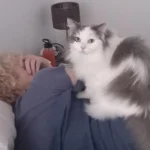Have you ever found your beloved feline tucked away in the most bizarre locations? That shoebox that was supposed to go to storage, the bathroom sink, or perhaps wedged behind your couch cushions. While it might seem like your cat is simply being quirky, there’s actually a fascinating emotional world behind these unusual sleeping choices.
Your cat’s tendency to choose odd sleeping spots stems from deep-rooted instincts that served their wild ancestors well. These behaviors aren’t random acts of feline weirdness. They’re carefully calculated decisions driven by complex emotional needs that most cat owners never fully understand. Let’s dive into the hidden meaning behind your cat’s favorite weird spot.
The Safety Instinct: Seeking Ultimate Protection

In the wild, cats must be vigilant against predators, and sleeping in unusual places is one way a cat can vary her routine to protect herself. Your house cat carries this ancient wisdom in their DNA, even though the biggest threat they face might be the vacuum cleaner.
Your cat may choose a napping spot that is high above everything, as in nature they need to be able to see all around themselves when they are at their most vulnerable during sleep. That peculiar choice to sleep on top of your bookshelf isn’t just about being difficult. It’s about having the tactical advantage of height while maintaining a clear view of potential threats.
A sense of security comes with finding a new spot to nap, and cats are pretty good hiders, so you might not even be able to find your pet’s new sleeping spot. This mysterious disappearing act serves their emotional need to feel completely protected during their most vulnerable hours.
Emotional Comfort Through Familiar Scents

Cats find the owner’s bed to be the most concentrated source of familiar scents, and they may choose to sleep there as it provides psychological and emotional comfort. Your scent becomes their security blanket, offering emotional reassurance in an unpredictable world.
The feeling of a soft blanket could remind cats of the kitten pile they probably slept in when they were a baby, which is why you might find them entwined in a comforter if there are no other pets around to snuggle with. Your laundry pile suddenly becomes incredibly appealing because it smells like home and safety.
Cats have scent glands on their faces, and sleeping face down can be a subtle way of marking their territory, leaving their unique scent which helps them feel more connected to their environment and establishes a sense of ownership and comfort. Every unusual sleeping spot becomes a little territory marked with their emotional signature.
Temperature Regulation as Emotional Self-Care

Cats move to adjust their bodies or regulate their temperature – when they get too warm in their sun spot, they’ll move to that cool sink, and when the floor gets too cold, they’ll seek out your bed. This isn’t just physical comfort; it’s emotional wellness management.
Cats are talented at seeking out snug spots like closets or sinks to manage their body temperature, and on chilly days you might catch your cat finding a warm nook to curl up and sleep in. That bathroom sink might seem odd to you, but to your cat, it represents the perfect temperature control center.
During winter months, cats will gravitate toward warmer sleeping spots such as places with artificial heat sources, like on top of radiators and in front of fireplaces. Their emotional state directly connects to their physical comfort, making temperature regulation a form of self-soothing behavior.
Stress Response and Emotional Withdrawal

Sometimes cats hide because they’re feeling stressed, and lots of things can cause our cats to feel stressed and hide away, especially things like other cats or fireworks. That strange new sleeping spot might be their way of saying they need space to process overwhelming emotions.
Similar to hiding, increased sleeping and lower activity levels are a way for your cat to cope with stress by removing herself from an overwhelming situation, and because stress places high demand on your cat’s body, she may sleep more to help recover from this physical strain. Your cat isn’t being antisocial; they’re practicing emotional self-preservation.
Face-down sleeping can be a psychological coping mechanism for cats, and when experiencing stress or significant changes in their environment, cats might retreat into this position as a way to feel more secure. Sometimes the weirdest sleeping positions are the most emotionally necessary.
Trust and Bonding Through Sleep Choices

When a cat chooses to sleep on you, it’s a profound demonstration of trust and emotional attachment, as cats are naturally cautious animals and vulnerability during sleep is a significant risk in the wild. Their unusual sleeping choices often reflect the depth of their emotional connection with you.
Cats are selective in their trust and often choose one primary person who makes them feel most secure, and sleep is a vulnerable state for cats, so choosing to sleep with you demonstrates complete trust. When your cat picks that spot right next to your keyboard while you’re working, they’re choosing emotional connection over comfort.
When cats sleep between your legs, it offers them a snug, safe space surrounded by your scent which is immensely comforting, and this protected nook minimizes disruptions while signifying deep trust and contentment. Even the most inconvenient sleeping spots can be declarations of love.
Territorial Claiming Through Sleep Patterns

Cats only feel comfortable sleeping in territory they have claimed, usually done by scratching or marking with scent, and to cement this claim, the cat will then sleep in the territory while prolonged time in one space makes the cat’s scent even stronger. Your cat’s unusual sleeping spots are actually strategic territorial expansions.
In multi-cat households, cats will alternate sleeping spots according to the hierarchy of the home, with dominant cats claiming preferred sleeping spots and sharing them with more submissive family members. That weird spot behind the couch might be prime real estate in your home’s feline social structure.
Cats are very territorial creatures, and when a sleeping cat curls up on you, it’s not just about comfort – your cat also marks you as part of its territory through scent glands in their face and body, releasing pheromones and solidifying their bond with you. Every strange sleeping choice is also a claim of emotional ownership.
Illness and Pain Management

If your cat has a chronic health condition such as arthritis, switching up where they snooze may help them find relief from their pain, and if their usual sleeping spot is hard to reach, they may seek a soft bed that’s easy to get into. Sometimes unusual sleeping spots are their way of managing physical discomfort.
When cats don’t feel well, their instinct is to hide as leftover survival behavior from their wild ancestors, so if your normally social cat suddenly ghosts you for more than a day, something could be off. That basement hiding spot might be their private recovery room.
Cats will hide when they’re feeling sick or unwell, and since cats can be prey in the wild, their instinct when hurt or ill is to hide from potential predators, and when they don’t feel well, they’ll try to remove themselves from their normal environment. Their emotional response to illness drives them to seek completely different sleeping arrangements.
Environmental Changes and Adaptation

Cats like things to stay the same, especially the layout of the home, and if you have remodeled or moved furniture around, the cat will need an adjustment period which causes stress initially while your cat relearns its terrain. New sleeping spots often reflect their emotional response to change.
Your cat may suddenly stop sleeping on the windowsill if something scares them, such as a bird hitting the window, and increased foot traffic or distracting noises may also prompt your cat to seek other sleeping accommodations. Their sleeping choices become emotional barometers for household changes.
Changes in your home environment can significantly impact where your cat chooses to sleep, and cats are particularly sensitive to temperature changes and will often select sleeping spots based on their thermal comfort. Every environmental shift triggers an emotional recalibration of their safe spaces.
Hierarchy and Social Dynamics

There is a hierarchy in your home amongst your pets, and bringing a new kitten into the mix can change the hierarchy and may make your dominant cats claim a new sleeping spot. Those sudden changes in sleeping preferences often reflect shifting emotional relationships within your household.
Cats may take to the cellar when kittens get on their nerves, and when the last one leaves for their new home, they come back upstairs and seize the power-sleeping chair. Every sleeping spot tells a story about your cat’s emotional position in the family hierarchy.
In multi-cat homes where there is tension, a cat may sleep in the owner’s bed to be kept safe from being the victim of an ambush. That decision to sleep in your bed instead of their usual spot might be a strategic emotional survival choice.
Seeking Privacy and Emotional Space

Your cat may be sleeping in a new and odd place simply because they’re seeking out some privacy, just like you wouldn’t want your bedroom in the middle of your living room. Sometimes the most unusual spots provide the emotional solitude they crave.
Sometimes cats like to feel hidden away, and they will choose places with only one entrance so they can carefully watch and defend only one direction, and when enclosed, they know they don’t have to watch their back. That cramped space under your desk isn’t uncomfortable; it’s emotionally perfect.
Finding somewhere hidden away might be warm and comfortable and provide the perfect place for a cat nap, and your cat might feel vulnerable while sleeping so their natural instincts tell them to sleep somewhere hidden and safe. Their need for emotional privacy drives them to the most unlikely locations.
Conclusion

Your cat’s unusual sleeping spots aren’t random quirks but carefully chosen emotional sanctuaries. Each location serves a specific psychological need, whether it’s seeking security, managing stress, claiming territory, or simply finding the perfect temperature for emotional comfort.
Understanding these hidden motivations can deepen your bond with your feline friend and help you create an environment that supports their emotional well-being. The next time you find your cat in the most bizarre sleeping spot, remember that they’re not being difficult – they’re being emotionally intelligent.
What do you think about your cat’s sleeping choices now? Tell us in the comments about the weirdest place you’ve found your feline friend catching some sleep.






